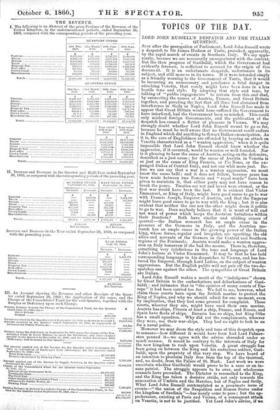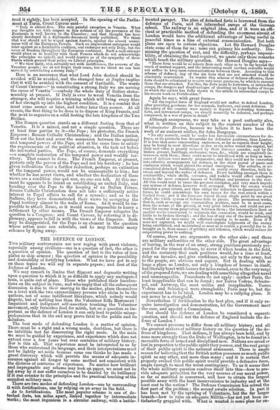TOPICS OF THE DAY.
LORD JOHN RUSSELL'S DESPATCH AND THE ITALIAN QUESTION.
JUST after the prorogation of Parliament, Lord John Russell wrote a despatch to Sir James Hudson at Turin, provoked, apparently, by the rapid march of events in Southern Italy. We say appa- rently, because we are necessarily unacquainted with the context. But the then progress of Garibaldi, which the Government had evidently foreseen, is sufficient to account for the origin of this document. It is an unfortunate despatch, unfortunate in its subject, and still more so in its terms. If it were intended simply as a friendly warning to the Government of Turin, that it would be incurring an unnecessary and perchance a fatal danger in attacking Venetia, that surely might have been done in a less hostile tone and style. By adopting that style and tone, by talking of " public engagements' to refrain from this and that, by connecting the names of Austria, France, and Great Britain together, and parading the fact that all three had abstained from interference in Sicily or Napl.ss, Lord John Russell has made it appear that Great Britain would have suffered the Government to have interfered, had the Government been so minded. This could only mislead foreign Governments, and the publication of the despatch has caused a flutter of pleasure in Vienna. We may strongly doubt whether Lord John Russell meant to go so far, because he must be well aware that no Government could endure in England which did anything to thwart Italian emancipation. As it is, the ears of Englishmen are offended by hearing an attack on Venetia characterized as a " wanton aggression," when it is quite impossible that Lord John Russell should know whether the aggression, if it occurred, would be wanton or well founded. Nor is it pleasing to hear the cause of Austria, acting on the defensive, described as a just cause ; for the cause of Austria in Venetia is as just as the cause of King Francis, or Pio Nono, or the ex- punged Dukes of Central Italy, and not one whit more just. Be- fore we can say that a war is a wanton aggression, we must know the casus belli ; and it does not follow, because peace has been made between two Powers and " royal words" have been given to maintain it, that either party may not have reason to break the peace. Treaties are not and never were eternal, or the first war would have been the last. It is evident that Victor Emmanuel, as King of Italy, might have good cause to go to war with Francis Joseph, Emperor of Austria, and that the Emperor might have good cause to go to war with the King ; but it is also evident that neither the one nor the other might deem it politic to go to war. Does anybody believe that it is want of will and not want of power which keeps the Austrian battalions within their frontiers ? Both have similar and abiding causes of quarrel- the Italian monarch has an ample cause in the presence of the Germans in Italy, and the Austrian mo-
narch has an ample cause in the growing power of the Italian king, whose forces, regular and irregular, are upsetting the old allies and servants of the German in the Central and Southern regions of the Peninsula. Austria would make a wanton aggres- sion on Italy tomorrow if she had the means. There is, therefore, something very infelicitous in the tone and language of Lord John's lecture at Victor Emmanuel. It may be that he has held corresponding language in his despatches to Vienna, and has lee- tured the Emperor, through Lord Loftus, on the subject of wanton aggressions. But the English public will not pair off the two de- spatches one against the other. The sympathies of Great Britain are Italian.
Lord John Russell makes a merit of the " indulgence" shown
by Great Britain to the embarkations and debarkations of Gari- baldi ; and intimates that in "the opinion of many courts of Eu- rope" it had been carried too far. We fail to see, however, what claim those courts have upon the British marine to protect the King of Naples, and why we should admit for one moment, even by implication, that they had some ground for complaint. Those courts, whoever they are, might have used their own marine. Austria has ships, Prussia at least a ship, France, and Russia, and Spain have fleets of ships. Bavaria has no ships, but King Otho has a small squadron. Why did not the complainants, whoever they were, use their war-ships. They had no right to look to us for a naval police.
'However we may deem the style and tone of this despatch open
to censure-how different it would have been had Lord Palmer- ston penned it-we agree with the advice shrouded under so much menace. It would be contrary to the interests of Italy for the new kingdom to rush upon Venetia. A great struggle has been going on between the King and his audacious soldier, Gari- baldi, upon the propriety of this very step. We have beard of an intention to proclaim Italy free from the to of the Quirinal, and, no doubt, from the Palace of St. Mark. Last week we were uncertain whether Garibaldi would prove to be a sane or an in- sane patriot. The struggle appears to be over, and wholesome counsels have prevailed. The Dictator is reconciled to the King, and the King has taken a decisive stride, not only towards the annexation of Umbria and the Marches, but of Naples and Sicily. What Lord John Russell contemplated as a proximate issue of events-" the union of the Neapolitan and Roman States under the kingdom of Sardinia "-has nearly come to pass ; but the ap- prehension, existing at Paris and Vienna, of a consequent attack on Venetia, is not to be justified. Yet Lord John's advice, if we
iead it rightly, has liein soceptia. In the opening of the Parlia- ment at Turin, Count Casour said-
" Italy is almost free. The only painful exception is Venetia. What our thoughts are with respect to this noblest of all the proviume of the Peninsula is well known to the Chamber; and that thought has been clearly developed in a diplomatic document lately published. We think that war should not be waged against Austria, against the almost unani- mous will of the European Powers. Such an improvident enterprise would raise against us a formidable coalition, and endanger not only Italy, but the cause of freedom throughout the European continent. Such a rash attempt would place us in hostility with those Powers which do not acknowledge the principles we uphold, and would deprive us of the sympathy of those States which ground' their policy on Liberal principles. " We view daily, nnd, certainly not with indifference, the sorrows of the Venetian people ; we do not forget their cause, but we think we can best serve it by constituting a strong Italy."
Here is an assurance that what Lord John desired should be avoided will be avoided, and the changed tone at Naples implies that it will be avoided with the consent of Garibaldi. The words of Count Cavour—" in constituting a strong Italy we are serving the cause of Venetia"--embody is whole duty of Italian states- manship at present. If Italy s ever to wrest Venetia from the stranger, she will require a training which will bring every fibre of her strength up into the highest condition. It is a combat that must come sooner or later, and better later than sooner. At all events, the first thing to be done is to dispose of King Francis, and the next to organize on a solid footing the late kingdom of the Two Sieilies.
The Roman question stands on a different footing from that of Venetia. It is a mixed, and not a simple question. There are at least four parties to it—the Pope ; his protector, the French Emperor ; Roman Catholic Christendom ; and the Italian nation. How cut the knot and sever the oonnexion between the spiritual and temporal powers of the Pope, and at the same time to satisfy the requirements of the political situation, is the task set before the interested parties. The Pope, of course, demands everything —a complete restoration of his temporal power and worldly ter- ritory. That cannot be done. The French Emperor, at present, protects only the person of, the Popo and not his territory ; he has given indications that a further reduction, perhaps an extinction of the temporal power, would not be unacceptable to him ; but whether he has secret views, and whether the realization of these views are a condition sine qua non, no one can telt At this mo- ment he appears to be intent on establishing an united Italy, and handing over the Pope to the keeping of an Italian Prince. Roman Catholic Christendom does not take a sufficiently active interest in Papal affairs to call for a crusade ; and as to the Italians, they have demonstrated their views by occupying the Papal territory almost to the walls of Rome. As it would be im- possible to attack Rome, so it would seem impossible to hurry a settlement by other means. The French Emperor relegates the question to a Congress ; and Count Cavour, by referring it to di- plomacy, appears to fall in with the views of the Emperor. Both may be disappointed, for the Pope is an element in the question whose action none can calculate, and he may frustrate many schemes by flying away.



























 Previous page
Previous page